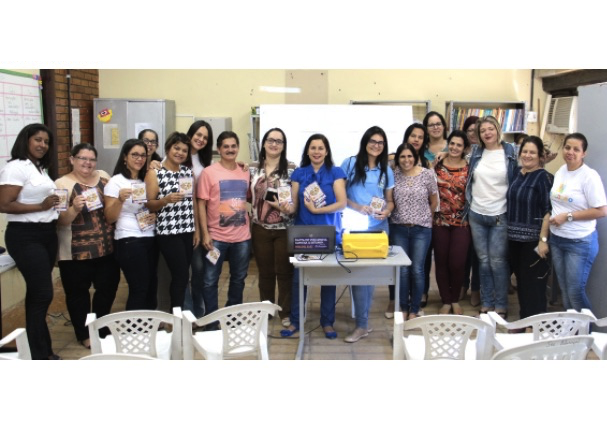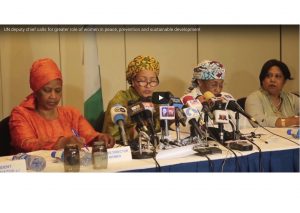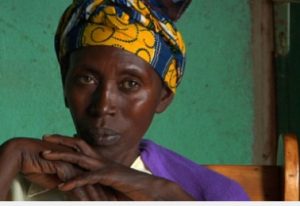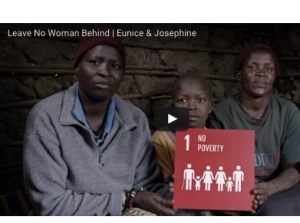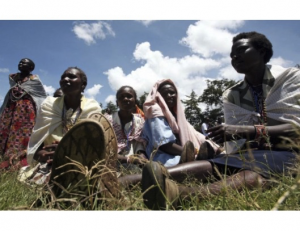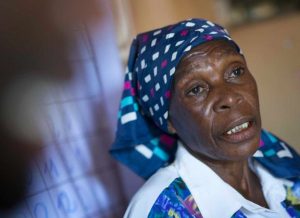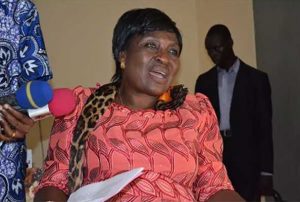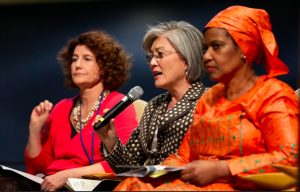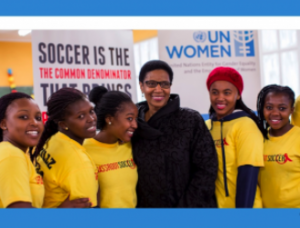. WOMEN’S EQUALITY .
An article from UN Women
Every year thousands of activists from civil society organizations around the world come to New York to take part in the Commission on the Status of Women, the global intergovernmental body exclusively dedicated to the promotion of gender equality and the empowerment of women. More than 3,900 non-governmental representatives from 138 countries participated in 2017. See some of their messages and perspectives on women in the changing world of work below.
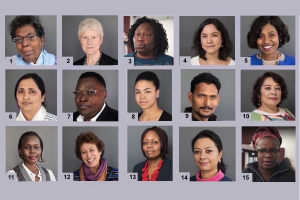
Click on image to enlarge
How has the world of work changed for women?
[1] Hazel Brown Executive Director of Network of NGOs for the Advancement of Women, Trinidad and Tobago
“I got married in 1962 and was told that married women who had jobs were required to give their earnings to their husbands. In 1962, the income tax law in Trinidad and Tobago considered an employed married woman in the same category of persons as children, imbeciles and people with insane mind. Eventually, we successfully advocated to change that law. But there remain other discriminatory laws that need to be amended. For example, domestic workers are not legally considered as workers and denied the benefits and the rights of all other workers, by law.”
[2] Diane Elsen, “Leontief Prize winner for Advancing the Frontiers of Economic Thought”, author, researcher and professor, United Kingdom
“Until recently, there was a rise in female labour force participation. Now that has levelled off and in some countries, it’s going down. But women’s share in unpaid and care work is not going down. In some countries there is a narrowing of the gender pay gap, and in others the progress on this has stalled. But gender pay gap only accounts for wages from formal employment; it does not factor in the earnings of millions of women who work in the informal sector or without proper contracts. When we looked at the gender earnings gap in UK, for example, it’s bigger than the gender wage gap.”
[3] Shirley Pryce, Former domestic worker, current Chair of the Caribbean Domestic Workers Network, Jamaica
“Before, only men used to sit on company boards, have the top jobs in Jamaica. Now that’s changing. More women are taking on management jobs. For domestic workers too, things have changed. We are more respected that we used to be; we are better aware of our rights and employers are more educated about our rights. But for domestic workers to be truly empowered, we need laws to protect their rights. Jamaica has ratified the ILO Convention on Domestic Workers, but now we are need to develop a national law. As the head of the Caribbean Domestic Workers Network, I am also advocating with other Caribbean countries to ratify the ILO Convention and then implement it through national laws.”
[4] Christian Mendoza Galàn, Coordinator on Economic, Social and Cultural Rights, Mexico
“In Mexico, we have social security linked with formal [waged] work, so that makes it harder for women who are not in formal labour force. We have more work, less money, and less labour rights for women. Adding women’s unpaid work to their paid work, women have more amount of work. This limits our opportunities to develop. The unpaid care work also is related to women’s sexual and reproductive rights, because if we have more children, we have more work at home. And, we need to engage in paid work too because we don’t have enough money to sustain the family.”
[5] Mariyam Mohamed Representative of Uthema, Maldives
“There are more women joining the workforce now, but 47 per cent of women are employed in informal sectors, in jobs where they don’t get pensions or other benefits. We have a new gender equality law but it doesn’t address the care work that women do. Since 1980s, we’ve been talking about state funded daycare but it has not happened. It does not endorse affirmative action or gender-responsive budgeting. We have laws, but no one knows about them. There is not enough budget allocated for the implementation of the laws.”
What will it take to bring women on equal footing with men in the world of work?
[6] Dr. Archana Integrator with Prada, India
“I am working with rural women and women farmers in India. For them, the pace of progress [in economic empowerment] is slower still. For women to have equal economic opportunities, men’s participation in the household chores and care work is essential. At the same time, women’s participation in the economic and political spheres must be promoted. There are many pro-women laws and policies in different countries, but they are not enforced.”
[7] Emma Kaliya Chairperson of FEMNET, Programme Manager of the Malawi Human Rights Resource Centre, and Equal Pay Champion, Malawi
“When it comes to bringing women equal to men, we have to make sure that the existing laws are enforced. The employment act in Malawi, for example, doesn’t allow for discrimination against women. It provides for maternity leave and other provisions. But when it comes to practice, employers may give only one week of maternity to women. Enforcement is important because if employers do not comply with the law, they can be punished and that would serve as a deterrence to others. As an Equal Pay Champion, I want to engage the minister of labour and other stakeholders in the private sector, and partner with trade unions to improve the situation of women in the informal sector. We also have to remove the barriers, such as sexual harassment at the workplace.”
(article continued in right column)
Question for this article
Prospects for progress in women’s equality, what are the short and long term prospects?
(article continued from left column)
[8] Marie Andrea Anick Jasmin, Young filmmaker, Haiti
“The biggest challenge for women in Haiti is to see themselves in decision-making positions, and in what they perceive as “male occupations’. In Haiti, girls don’t see themselves as presidents, engineers or leaders. We must change the mentality and change will come with education at primary, secondary and university levels, sexual and reproductive education, and education that improves women’s self-esteem.”
Our issues
[9] Roki Kumar Breakthrough, India
“It is not enough to say that women are working, so they are economically empowered. For a woman to be empowered, she should also be able to earn at the same level as a man. She should also have the right to spend her own money the way she wants. The biggest problem in my country is patriarchy. We cannot achieve gender equality without men playing a part.”
[10] Maria Eugenia Romero, Executive Director of Equidad de Género, Ciudadanía, Trabajo y Familia A.C., México
“In Mexico, we have free public health care. But when women try to see a doctor, there are no appointments available, or the clinic is too far away from them…or the medicines and contraceptives they need are missing. Providing healthcare to women is not seen as a right but as a luxury. We have found that generally women do not receive the contraceptive methods they want, but the one that is available.”
[11] Sandra Letio Youth entrepreneur, Uganda
“I was 23 years old and unemployed, looking for jobs, but finding none. I had USD 15 to invest and a basic recipe for making soaps. Today, my business is valued at USD 700,000. When I first started, many people refused to take me seriously, or give me contracts, because I was young. Some men even harassed me; said they would give me business if I married them. I am the ambassador for youth entrepreneurs in Uganda. We may be young, but we should be given equal opportunities.”
[12] Janneth Lozano Bustos Director of Community Support Corporation (Codacop), Colombia
“Most [indigenous] women work is in agriculture…Some of what they produce, they can sell. We work with women so that they learn to value that work as actual work. Before, they did not even recognize it as such. We are trying for women to have autonomy over their own resources. If she is the one who is raising the hen, and she is going to sell it, then she has the right to lead the negotiation and receive the money! Often it is her [male] partner who does that. If someone wants to buy something, [women] say, “I don’t know anything about that, talk to him”, and then it is the partner who would take the money, and she would never see a dime.”
[13] Patricia Munabi Executive Director of Forum for Women in Democracy, Uganda
“We need to first raise awareness about why it is important to look at a budget with a gender lens. When we began to work with citizens at grassroots levels on gender-responsive budgeting, we asked them what their actual needs were, and then taught them to track where the money is going. Because local women spoke out and said, ‘we need more funding for family planning,’ the government created specific budget lines for family planning. We’ve seen more girls going and staying in schools because communities demanded for separate toilets for boys and girls. Prior to the last election, the government promised to provide sanitary towels for girls, but then the Ministry of Education said there was no money in the budget for sanitary towels.”
[14] Dhitipriya Ghosh Head of Human Resource Management of Breakthrough, India
“Garment factories are the second largest employer for women in India. Women in garment factories are experiencing multiple tiers of violence. On the factory floor, they face rampant sexual harassment. We not only worked with the women, but also worked with the factory management, bringing the Human Resources Management team into the discussion. Once they realized that by making it a safe workspace for women, the productivity goes up, they enforced measures to make their factories safe workplaces. Within 3 years, we had a marked improvement in women’s safety in the workspace.”
[15] Lucia Makamure
Alliance and Partnerships Officer, Gender Links, South Africa
“In our part of the world, the biggest impact of climate change is access to water. Climate change has a woman’s face. It is mostly women, and young girls, who are affected. It’s girls and women who have to sacrifice the time they could use for studying and school, to go out to fetch water. They have to walk longer to find water. When it floods, it’s the women who have to now go out to look for food for the family. Gender must be at the heart of any climate change policy.”
